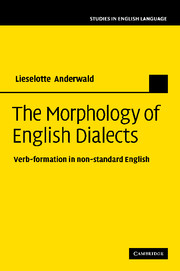Book contents
- Frontmatter
- Contents
- List of figures
- List of maps
- List of tables
- Preface and thanks
- Acknowledgement of sources
- 1 Introduction
- 2 Past tense theories
- 3 Naturalness and the English past tense system
- 4 Sellt and knowed: non-standard weak verbs
- 5 Drunk, seen, done and eat: two-part paradigms instead of three-part paradigms
- 6 Come and run: non-standard strong verbs with a one-part paradigm
- 7 Conclusion: supralocalization and morphological theories
- Appendix 1 Verb classification
- Appendix 2 SED localities and list of counties
- Bibliography
- Index
7 - Conclusion: supralocalization and morphological theories
Published online by Cambridge University Press: 30 July 2009
- Frontmatter
- Contents
- List of figures
- List of maps
- List of tables
- Preface and thanks
- Acknowledgement of sources
- 1 Introduction
- 2 Past tense theories
- 3 Naturalness and the English past tense system
- 4 Sellt and knowed: non-standard weak verbs
- 5 Drunk, seen, done and eat: two-part paradigms instead of three-part paradigms
- 6 Come and run: non-standard strong verbs with a one-part paradigm
- 7 Conclusion: supralocalization and morphological theories
- Appendix 1 Verb classification
- Appendix 2 SED localities and list of counties
- Bibliography
- Index
Summary
Much regional variation is being lost as the large number of traditional dialects covering small geographical areas gradually disappear from most, though by no means all, parts of the country. These, however, are being replaced by a much smaller number of new modern dialect areas covering much larger areas. The dialects and accents associated with these areas are much less different from one another, and much less different from RP and Standard English, than the traditional dialects were.
(Trudgill 2001: 179)Summary of findings
The most striking result of this investigation is the fact that processes predicted by universal morphological naturalness (Mayerthaler) play only a minor role. If anything, universal natural morphology predicts in the realm of the verb a continuous shift of strong verbs into the weak verb class (‘weakification’). However, the investigation in Chapter 4 has shown that while weakification does take place, it is by no means frequent and, in the majority of cases, can be explained by the retention of historically attested forms. Weakification, contrary to Mayerthaler's predictions, thus constitutes only a minor strategy. In the comparison with more modern data especially (e.g. from COLT, representing London teenage speech in the 1990s), we can see that strong verbs are remarkably resilient and resist the trend towards weakification on a grand scale.
- Type
- Chapter
- Information
- The Morphology of English DialectsVerb-Formation in Non-standard English, pp. 183 - 197Publisher: Cambridge University PressPrint publication year: 2009



